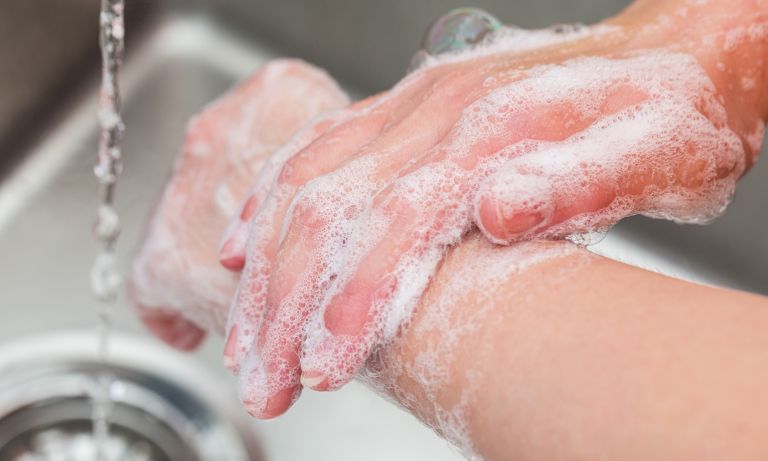Do you have a cleaning obsession? Are you always tidying up, organizing your things, and making sure everything is just perfect? If so, you might have OCD. OCD, or Obsessive Compulsive Disorder, is a mental disorder that causes people to have recurring and unwanted thoughts (obsessions) and/or behaviors (compulsions) that they can’t control. In this blog post, we will discuss OCD cleaning and how it affects people’s lives. We’ll also provide some tips on how to deal with OCD symptoms.
Contents
What Is ” OCD Cleaning”?

OCD cleaning or obsessive–compulsive disorder (OCD) cleaning is an extreme form of housekeeping characterized by repetitive, rigid, and often excessive cleaning rituals. People who suffer from OCD cleaning may feel compelled to clean for hours at a time, follow specific patterns and order with their cleaning activities, or obsessively keep certain areas of the home immaculately clean while neglecting other areas entirely.
The cleaning activities of someone with OCD cleaning can range from regularly vacuuming and dusting to obsessively scrubbing floors and wiping down surfaces. Some people may even become so consumed by the cleaning routines that they spend all day on one task, such as scrubbing the bathroom floor for hours at a time.
When OCD cleaning becomes an obsession, it can interfere with a person’s daily life and lead to feelings of anxiety and depression. Fortunately, there is help available for people suffering from OCD cleaning. One can use therapy, medication, and lifestyle changes can all also help to manage the disorder.
Signs of OCD Cleaning
There are a few signs that can indicate someone may be suffering from Obsessive-Compulsive Disorder (OCD) regarding cleaning. These include:
Excessive Hand Washing or Body Hygiene
One of the most common indicators of OCD is an excessive or irrational fear of germs and/or dirt. This can manifest itself in obsessive hand washing, showering, or other body hygiene routines. Someone with OCD might feel the need to wash their hands after every contact they make with something they perceive as “dirty” – even if it is something relatively harmless like holding a doorknob or shaking someone’s hand.
Rigid Cleaning Routines
Someone with OCD will often establish rigid cleaning routines that must be done at specific times. These rituals might include mopping a certain room multiple times a day, vacuuming carpets over and over again, or dusting surfaces excessively. Additionally, these activities may take a long time to complete as the person may have to go over every inch of an area multiple times for comfort.
Extreme Perfectionism
The perfectionist mindset associated with OCD can result in a person spending hours cleaning and organizing items in precise ways. This might include arranging clothing by color or type, folding towels perfectly, or organizing shelves alphabetically and symmetrically. Even if you do a task, the individual may still feel compelled to do it again until they are satisfied by its appearance.
Devaluation of Time
Someone with OCD may find themselves struggling to move on from tasks related to their cleaning rituals. This is even if they recognize that it isn’t something that needs to be done right away. They may also feel overwhelmed by the amount of time and effort it takes to do these tasks. This leads them to devalue other aspects of their life that could be used for more productive or enjoyable activities.
Constant Rumination
Someone with OCD cleaning may find themselves constantly thinking and worrying. This can lead to a never-ending cycle of rumination and stress, making it difficult for them to focus on other important aspects of their life. It can also cause extreme anxiety if they fear that something hasn’t been properly cleaned or disinfected.
If you notice these signs in yourself or someone close to you, consider speaking to a mental health professional who specializes in treating OCD.
Reasons For OCD Cleaning

Other than being neat and tidy, people with Obsessive-Compulsive Disorder (OCD) often feel compelled to clean excessively. They may be driven by a fear of contamination or an obsession with the need for order. People with OCD may resort to excessive cleaning as a way of managing their anxiety and feeling relief from their intrusive thoughts that something bad will happen if they do not complete their rituals.
Some of the other reasons for OCD Cleaning may include:
• Fear of germs, dirt, and contamination. People with OCD who fear germs and contamination may be compelled to clean excessively to protect themselves from perceived threats.
• Need for perfect order and symmetry. People with OCD often feel a need for everything in their environment to be orderly and symmetrical. This can lead to excessive cleaning as they strive to create a perfectly ordered environment.
• Hopes of avoiding bad things from happening. People with OCD may have intrusive thoughts that something terrible will happen if they do not complete their rituals or perform specific tasks such as cleaning obsessively. They worry that something bad will occur if these rituals aren’t performed and attempt to ward them off by performing them.
• Compulsion to do something. People with OCD may feel a strong compulsion to clean as part of fulfilling their rituals and providing themselves with relief from anxiety or intrusive thoughts. Also, the act of cleaning can become so ingrained that it is difficult to stop once started.
• Difficulty coping with stress. For some people with OCD, excessive cleaning is a way of managing their stress and anxiety levels. It can be a distraction from overwhelming emotions or intrusive thoughts and provide them with a sense of control in an otherwise chaotic world.
These are some of the reasons why people with OCD may resort to excessive cleaning. It is important to understand the motivations behind it if you are seeking to help a loved one who suffers from this disorder.
Consequences of OCD Cleaning
The consequences of OCD cleaning can be quite severe depending on the severity of the disorder. Extreme cases may cause:
Physical Symptoms
One of the most common physical symptoms associated with OCD cleaning is exhaustion. Excessive cleaning can take up a lot of time, energy, and resources, leaving little to nothing left for other important tasks and activities. In addition, the stress that comes with trying to keep everything neat can lead to elevated blood pressure, lack of sleep, and even chest pains. Some of the physical symptoms associated with OCD cleaning are not as immediately evident and can include joint pain, muscle tension, headaches, nausea, and dizziness.
Emotional Symptoms
The emotional toll of having OCD can be especially hard on those affected. People may feel embarrassment or shame when their disorder is revealed to others, leading to feelings of isolation and loneliness. Additionally, the constant pressure to keep everything clean can lead to severe anxiety and depression. This in turn can cause low self-esteem and an inability to focus on tasks unrelated to cleaning or organizing. Also, people with OCD may develop a fear of dirt and germs, leading them to wash their hands excessively or avoid touching certain items.
Financial Troubles
Having OCD can also affect your financial situation in various ways. For example, those who are constantly buying cleaning supplies to keep their home neat can quickly find themselves overspending. In addition, the time you invest in cleaning can take away from hours that could otherwise be spent at work, resulting in lost wages. Finally, some individuals may even become so consumed by their disorder that they are unable to hold down a job and support themselves financially.
Social Life Impact
The obsessive desire to clean everything around them can also make socializing difficult for those with OCD. Since these individuals spend much of their energy on cleaning, they may be unable to participate in social activities or spend time with friends and family. This can lead to feelings of isolation and guilt. Furthermore, people with OCD may become embarrassed by their disorder and avoid revealing it to others, leading them to keep a distance from other people as much as possible.
Relationship Problems
OCD cleaning can also put a strain on your relationships with family and friends, who may not understand the reasons you are so particular about keeping your home clean. This can lead to feelings of guilt and frustration, which could in turn put additional strain on the relationship. It is important to communicate openly with those closest to you if OCD cleaning is an issue; understanding and compassion from your loved ones are essential for helping relieve any anxiety over this behavior.
How To Manage OCD Cleaning?

Managing OCD cleaning can be tricky and requires patience, understanding, and compassion. It’s possible to make real progress in managing the behavior with a few simple steps:
1. Establish clear rules and expectations for the specific behaviors you want to stop or change. Make sure everyone who interacts with your loved one understands these rules and expectations. This is so that everyone is on the same page.
2. Separate cleanliness from safety: Your loved one needs to realize that just because something isn’t perfectly clean does not mean it’s unsafe or unhealthy. Allow them to engage in helpful activities. These are such as wiping down counters but avoiding getting into debates about what is “clean enough” versus “too clean.”
3. Allow for some control – It can be helpful to provide tasks that your loved one can control. These are such as folding laundry or wiping down surfaces. It is to help them feel a sense of accomplishment and reduce the need to excessively clean.
4. Encourage healthy distractions – suggest activities that will occupy their mind and body to take the focus away from cleaning. This could include taking a walk, playing a game, reading a book, or engaging in another hobby that they enjoy.
5. Seek professional help – it’s important to seek professional help if your loved one is unable to manage their compulsions on their own with the strategies above. A mental health professional can assess the severity of the disorder, provide advice and guidance, and create a treatment plan.
OCD cleaning can be difficult to manage but with an open dialogue, clear expectations, understanding, and dedication to helping your loved one through their battle – it is possible to make progress in managing their OCD behaviors.
Conclusion
OCD cleaning can be a great way to keep your home neat. It can also bring some relief from anxiety and help you feel more in control of your space. While it may not work for everyone, many people find that OCD cleaning is a beneficial habit to have. Before starting, it’s important to understand the purpose of each task and have realistic goals in mind so that cleaning does not become overwhelming or stressful. With proper practice and organization, OCD cleaning can make keeping up with a clean home much easier.
Spending too much time on excessive cleaning or worrying about dirt or germs can lead to obsessive-compulsive disorder (OCD).
For more information and guidance, please contact OCDMantra. OCD is a mental health disorder characterized by obsessions and compulsions. If you have any queries regarding OCD treatment, ERP therapy experienced therapists at OCDMantra can help: Book a trial OCD therapy session.


